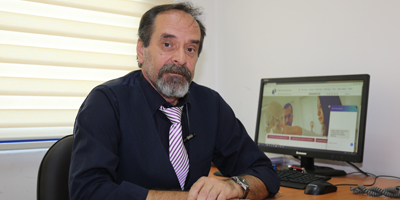Breast Cancer Should Not Be Afraid, Be Afraid of Being Late
Head of the European University of Lefke (EUL) Faculty of Health Sciences, Physiotherapy and Rehabilitation Department Assist. Prof. Dr. Aydın Meriç provided information about breast cancer. Meriç said, “Breast cancer, which is a disease whose incidence increases with age, is a type of cancer that has a very high possibility of recovery when caught in its early stage. “Breast cancer is the most common cancer in women.”
“Although the strongest risk factor is family history of breast cancer, the most frequently defined risk factors such as age and reproductive factors cannot be easily modified. This may change in the future as more information becomes available to explain some of the key biological mechanisms of pregnancy and lactation. For example, nowadays, high birth weight is positively correlated with breast cancer risk, while low placental weight, small diameter and increased blood pressure during pregnancy have been reported to be negatively correlated with breast cancer risk in mother and daughter. He pointed out that with effective treatment, life expectancy and quality can be increased.
Increase your consumption of fresh fruits and vegetables, especially rich in vitamins A and C, for protection from breast cancer.
Meriç said, “For this purpose, it is important to teach primary and secondary prevention methods to women. Within the scope of primary prevention methods, practices such as healthy nutrition, preterm birth, breastfeeding, physical activity, prevention of hormone use, surgical early menopause, chemoprevention, prophylactic mastectomy, prevention of alcohol and cigarette use are recommended by raising awareness of individuals with health education. In the secondary prevention step, the primary goal is early diagnosis ”.
“The methods used to diagnose a possible breast cancer at an early stage in women who have no complaints or masses from their breasts are called“ Screening Methods ”. This should usually begin after the age of 40. However, since the age of 30, it is appropriate to check the breasts with monthly breast self-examination. He stated that screening programs including detailed history, physical examination, diagnosis of risk factors, breast self-examination, physician examination and mammography are included in order to detect breast cancer at an early stage.
Meriç listed what should be done for early diagnosis in breast cancer as follows:
– Mammography; In women who do not have any complaints about their breasts, annual mammography after the age of 40 enables the detection of breast cancer before reaching the palpable size. Those with breast cancer in their family should have their first mammography from the age of 32.
– It is an easy method for women to self-examine monthly, and it should usually be done 4-5 days after the end of menstruation. Women who have had menopause or uterine or ovarian surgery should periodically perform a self-examination of the breast once a month.
– After the age of 40, women who have no complaints in their breasts should be examined by a doctor once a year.
Meriç said, “For the prevention of breast cancer, increase the consumption of fresh fruits and vegetables rich in vitamins A and C, reduce animal fats, consume more pulp foods, reduce smoked salty and canned foods, do not smoke, try not to gain excess weight, do not use alcoholic beverages, physical activity. He stated that it is extremely important for health professionals to make women aware of primary and secondary prevention methods and risk factors in order to prevent breast cancer.

